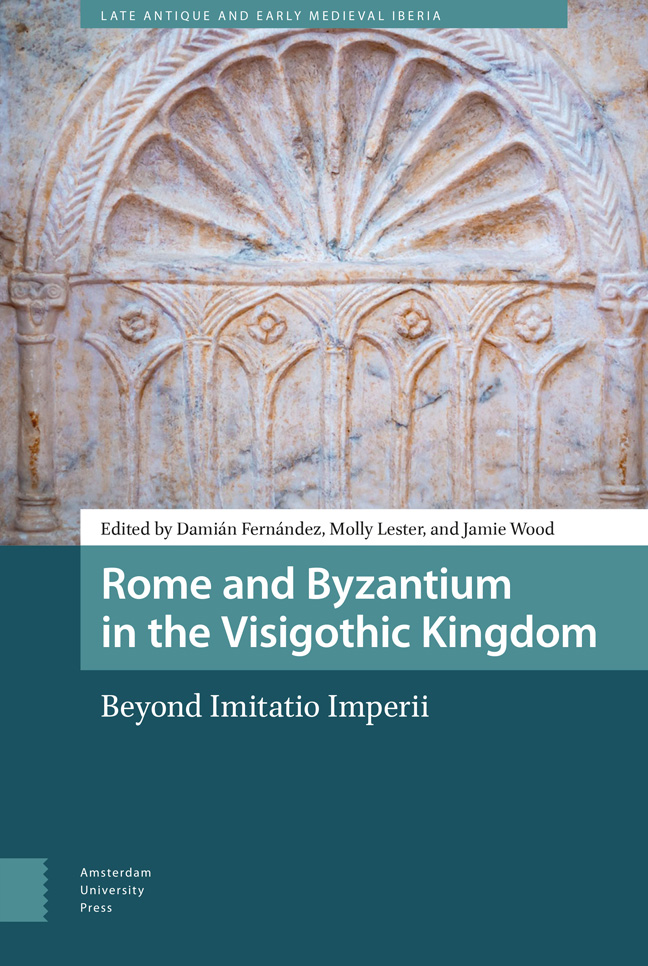Book contents
- Frontmatter
- Contents
- List of Figures and Tables
- Abbreviations
- Acknowledgements
- Maps
- Introduction
- 1 Visigothic Spain and Byzantium: The Story of a Special (Historiographical) Relationship
- 2 The Development of the Visigothic Court in the Hagiography of the Fifth and Sixth Centuries
- 3 Experiments in Visigothic Rulership: Minting and Monetary Reforms under Alaric II
- 4 A Comparison of Roman and Visigothic Approaches to Exile
- 5 The Roman Jewel in the Visigothic Crown: A Reassessment of the Royal Votive Crowns of the Guarrazar Treasure
- 6 Capitalhood in the Visigothic Kingdom
- 7 Making Rite Choices: Roman and Eastern Liturgies in Early Medieval Iberia
- 8 Ethnicity and Imitatio in Isidore of Seville
- 9 Re-imagining Roman Persecution in the Visigothic Passions
- 10 Romanness in Visigothic Hagiography
- 11 Empire and the Politics of Faction: Mérida and Toledo Revisited
- 12 The Agents and Mechanics of Connectivity: The Mediterranean World and the Cities of the Guadiana Valley in the Sixth Century
- 13 Staying Roman after 711?
- Index
11 - Empire and the Politics of Faction: Mérida and Toledo Revisited
Published online by Cambridge University Press: 20 February 2024
- Frontmatter
- Contents
- List of Figures and Tables
- Abbreviations
- Acknowledgements
- Maps
- Introduction
- 1 Visigothic Spain and Byzantium: The Story of a Special (Historiographical) Relationship
- 2 The Development of the Visigothic Court in the Hagiography of the Fifth and Sixth Centuries
- 3 Experiments in Visigothic Rulership: Minting and Monetary Reforms under Alaric II
- 4 A Comparison of Roman and Visigothic Approaches to Exile
- 5 The Roman Jewel in the Visigothic Crown: A Reassessment of the Royal Votive Crowns of the Guarrazar Treasure
- 6 Capitalhood in the Visigothic Kingdom
- 7 Making Rite Choices: Roman and Eastern Liturgies in Early Medieval Iberia
- 8 Ethnicity and Imitatio in Isidore of Seville
- 9 Re-imagining Roman Persecution in the Visigothic Passions
- 10 Romanness in Visigothic Hagiography
- 11 Empire and the Politics of Faction: Mérida and Toledo Revisited
- 12 The Agents and Mechanics of Connectivity: The Mediterranean World and the Cities of the Guadiana Valley in the Sixth Century
- 13 Staying Roman after 711?
- Index
Summary
Abstract
When Reccared presided over the conversion of the Visigoths in 589, John of Biclarum wrote that he embodied Constantine at Nicaea and Marcian at Chalcedon. It is tempting to see late antique state formation through the lens of such imitatio imperii, but what did that mean in practice? Our understanding of the ‘baptism of Spain’ is coloured by the polemical Lives of the Fathers of Mérida, but this beguiling seventh-century text can also reveal elements of Visigothic ‘imperial’ governance, enabling us to diagnose the available resources and dynamics of rulership. From its partisan sketches of civic politics and factions, we can reconstruct something of royal interactions with local elites and how Visigothic kings had to work with or around local actors, in doing so recapitulating a defining feature of Roman imperium.
Keywords: Visigothic kingship; local politics; hagiography; epigraphy; Mérida; Toledo
Now the aforementioned King Reccared, as we have said, took part in the holy council, recalling for our times how the princeps of old, Constantine the Great, enlightened the holy synod of Nicaea by his presence, as well as
Marcian, the most Christian imperator, at whose instigation the decisions of the synod of Chalcedon were confirmed.
Introduction
What distinguishes a kingdom from an empire? For a passing moment in the early fifth century Athaulf may have mused on converting Rome into a Gothic imperium, yet the realm ruled by his descendants from the late sixth to the early eighth called itself variously the ‘homeland’ or ‘kingdom of the Goths’ or the ‘kingdom of Hispania’, never an empire. Much about it was imperial, of course, in that capacious Roman sense: the provinces which its kings administered, the cities they founded, the laws they enacted as ‘prince’ and ‘Flavius’, their codes and coins, legations and letters, their votive crowns. As in the Donation of Constantine, where the emperor places a tiara upon the head of the pope to wear henceforth in all papal processions ‘in imitation of our imperial power’, Rome casts so long a shadow that too often what we mean by imitatio imperii is any such emulation of its symbols of authority. But can we go beyond—is there a beyond—symbolism?
- Type
- Chapter
- Information
- Rome and Byzantium in the Visigothic KingdomBeyond Imitatio Imperii, pp. 277 - 316Publisher: Amsterdam University PressPrint publication year: 2023



